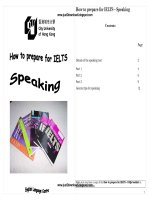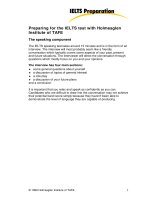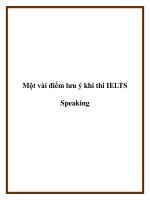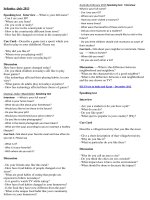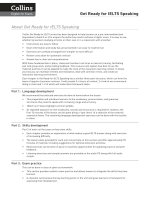Basic ielts speaking
Bạn đang xem bản rút gọn của tài liệu. Xem và tải ngay bản đầy đủ của tài liệu tại đây (35 MB, 211 trang )
`đWIWYV
Free Motivations
Everyday
...Q tặng cuộc sống
sharenha
com
Chúng tơi chia sẽ hàng ngàn bài viết kinh
nghiệm học và tips thi IELTS cũng như rất nhiều
phương pháp tự học, tài liệu & khóa học tiếng
Anh hồn tồn miễn phí
SHARENHA
Kho tài liệu & Khóa học tiếng Anh
Lớn nhất Việt Nam hiện nay
Basic IELTS
Speaking
Zhang Juan — Alison Wong
© Consolidating Your English Ability
e Improving Your English Speaking Skill
© Providing General Knowledge
© Developing Your Test-Taking Skill
NHA XUAT BAN TONG HOP
THÀNH PHỐ HỖ CHÍ MINH
Cơng ty TNHH
Nhân Trí Việt
Basic [IELTS
Speaking
¢ Zhang Juan
¢ Alison Wong
NTV
NHA XUAT BAN TONG HOP
THÀNH PHỐ HỖ CHÍ MINH
Cong ty TNHH
Nhân Trí Việt
Basic IELTS Speaking
Copyright © 2010-2013 Beijing Language and Culture University Press
Published in Vietnam, 2013
This edition is published in Vietnam under a license Agreement between Beijing Language and
Culture University Press and Nhan Tri Viet Co., Ltd.
All rights reserved. No part of this publication may be reproduced, stored in a retrieval system,
or transmitted, in any form or by any means, electronic, mechanical, photocopying, recording,
or otherwise, without the prior written permission of the copyright owner.
FOREWORD
Exam preparation is a vital
nised certificate, specifically
have relevant and beneficial
Writing have, consequently,
period for candidates who wish to obtain an internationally recogthe IELTS one. Such candidates will find it less stressful if they can
materials in hand. Basic IELTS - Listening, Reading, Speaking, and
been designed to meet your demand.
Basic IELTS series aim at
¢ providing IELTS candidates with a basic English language ability,
¢ enlarging candidates’ stock of vocabulary, and
* giving candidates insight into the social life and culture of the English-speaking communities.
Basic IELTS series are suitable for those who want to achieve a band score of 4 — 5+ in the
IELTS test. They are also practical materials for high school students, students of pre-intermediate level, and for those who want to build up a solid foundation in their English language
competence.
The main features of this series of books are as follows:
¥ Designed in accordance with the content, format and objectives of the IELTS test
Vv Reflecting the updated IELTS question types
v Meeting the demand and expectations of the focused candidates
v Containing authentic, interesting, and rewarding materials
As far as Basic IELTS Speaking is concerned, it is arranged into three parts with a total of five
chapters whose themes centre upon different kinds of questions in each part of the IELTS
Speaking test. Especially, varied and well-designed tasks which are typical in the IELTS Speaking test are provided so as to facilitate actual tests in the most effective way. Moreover, lists of
Useful Words and Expressions provided with their phonetic symbols added below Dialogue
Study aim at helping you not only to improve your pronunciation but to give you a chance to
check their meanings as well. It is said that the more time you spend on looking up new words,
the better you can understand and use them. In addition, Useful Sentence Structures enable
you to accurately express yourself in English. Last but not least, a table of key to the exercises is
presented so that you can use them to check your work and see your progress day by day.
Basic IELTS Speaking certainly meets the need of candidates who will sit the Academic Module,
but General Training Module candidates can also find it very beneficial.
On completion of Basic IELTS Speaking, you will be able to
¢ do typical tasks in the IELTS Speaking test,
¢ apply useful tips and techniques in answering questions of the IELTS test,
¢ be well prepared for gaining a higher score in your actual exam, and
¢ achieve your desired band score in the near future. Hopefully, you will find Basic IELTS Speaking truly helpful and rewarding, and you can eventually achieve your desired goal.
Zhang Juan — Alison Wong
www.nhantriviet.com
3
IELTS OVERVIEW
I, The IELTS Test
IELTS, the International English Language Testing System, was introduced in 1989. It is an
English language proficiency test that is required to be taken by non-native students for studying
in countries where the medium of instruction is English. It is now used for this purpose around
the globe.
The IELTS is managed by three main institutions: the British Council, IDP: IELTS Australia
and the University of Cambridge ESOL Examinations (Cambridge ESOL). This is important to
understand in order to prepare for what is essentially an examination of British and not American
English.
Depending on the course of study that is planned to take, candidates must select to sit either the
Academic IELTS test or the General Training IELTS test. This choice must be made when applying to sit the test.
Academic Module
The Academic IELTS test is necessary for candidates who plan to study at universities (undergraduate or postgraduate courses), and will test the candidates’ ability both to understand and to
use complex academic language.
General Training Module
The General Training Module of IELTS is for students seeking entry to a secondary school or
to vocational training courses, and also for those who wish to apply for immigration to countries
such as Canada, Australia, or New Zealand.
IELTS is not recommended for candidates under the age of 16.
II. The IELTS Test Format
There are four sub-tests to the IELTS test: Listening, Reading, Writing, and Speaking. Candidates must sit all four sub-tests. While all candidates take the same Listening and Speaking
tests, they sit different Reading and Writing tests, depending on whether they have selected the
Academic IELTS test or the General Training IELTS test. These two do not carry the same weight
and are not interchangeable.
The first three sub-tests — Listening, Reading, and Writing — must be completed in one day.
There is no break between the sub-tests. The Speaking test may be taken, at the discretion of the
test centre, in the period of seven days before or after the other sub-tests of the IELTS test.
4
www.nhantriviet.com
This table helps you to understand more clearly about the format and timing of the two IELTS
modules:
ACADEMIC
4 sections; 40 questions
30 minutes
3 sections; 40 questions
GENERAL
TRAINING
4 sections; 40 questions
30 minutes
3 long texts
1 hour
3 sections; 40 questions
3 long texts
1 hour
2 tasks
2 tasks
1 hour
1 hour
3 sections
3 sections
11 - 14 minutes
11 - 14 minutes
What can you bring into the test room?
Only pens, pencils and erasers. You must bring the passport/national identity card you used on
the IELTS Application Form to the test. You must leave everything else outside the examination
room, including mobile phones and pagers which must be switched off and placed with personal
belongings in the area designated by the supervisor. If you do not switch off your phone/pager or
keep it on you, you will be disqualified.
Will there be more than one examiner?
No, the Speaking test will take the form of a conversation between the candidate and one certified IELTS examiner.
Will the Speaking test be recorded?
Yes, it is recorded onto an audiocassette or a digital recorder.
What do you need for the Speaking test?
You must bring the same identification documents you supplied on your IELTS Application
Form and used for the rest of the test. Your ID will be checked before you enter the test room.
www.nhantriviet.com
>
Contents
IELTS Overview
Chapter 4 Part 3 of the IELTS Speaking Test .. 141
Chapter 1 The IELTS Speaking Test............. 7
Unit 1 An Overview of the IELTS Speaking
Unit 1 How to Prepare for Part 3 of the IELTS
Speaking TesẢ...........................
.
seo. 142
Unit 2 Discussion Practice for Part 3 of the
`...
IELTS Speaking Tes(......................
2.2 22212 02 146
Unit2 How to Prepare for the IELTS Speaking
: `...
Description.....................................-22-2rree 146
Agreement/ Disagreement...................
2 150
;
Comparison and Contrast................................... 154
Chapter 2 Part 1 of the IELTS Speaking Test ... 17
Evaluation
Unit 1 How to prepare for Part 1 of the IELTS
Speaking TesẢ............................. 222212222212
peculation................................2z=eoee Tổ
xe 18
Unit2 Conversation Practice for Part 1 of the
IELTS Speaking Test..............
¬—¬. 24
159
Unit3 Topic Practice for Part 3 of the IELTS
Speaking Test 00cm
168
Talking about Home Towns and Joba............ 24
Talking about Stndies and Schools......................
38
Chapter5 IELTS Sample Speaking Tests _. 173
Talking about Holidays/Festivals and Travels . 50
IELTS sn
Talking about Interests/Hobbies and Friends .. 64
IELTS Sample 3peaking Test 2........................ t7
Talking about Transportation and My Home...76
Answer Key
Speaking TeSt Dn
A
181
Chapter3 Part 2 of the IELTS Speaking Test . . 89
Unit 1 How to Prepare for Part 2 of the IELTS
Speaking Test....................................... 90
Unit 2 Presentation Practice for Part 2 of the
TELTS Speaking Test............................. 92
Describing People................................
2-2 sec 92
Describing ltems and Past Events................ 97
Describing Places and Changes...................... 104
Describing Programmes and Books.................. 111
Describing Stories and ldeas.............................. 118
Describing Shopping Experiences and
l0 m............
125
Unit3 Topic Card Practice for Part 2 of the
IELTS Speaking Test............................. 131
6
www.nhantriviet.com
Chapter 1
The IELTS Speaking Test
Unit!
An Overview of the IELTS Speaking Test
1. The IELTS Speaking Format
The IELTS Speaking Test is the same for both the Academic and General Training modules.
It is different from the other parts of the IELTS test because it is a one-to-one interaction between
a candidate and an examiner. The three parts in the test give the candidate the opportunity to use
a range of different speaking skills. The Speaking test is recorded.
The following table is the format of the IELTS Speaking test:
Task
Task Description
Time
Part 1
Introduction and
Interview
The examiner introduces himself/herself and confirms candidate’s identity by asking questions about the candidate. Next, the
examiner asks the candidate about familiar topic frames.
4-5 minutes
Part 2
The examiner asks the candidate to speak for 1-2 minutes on a
particular topic. Information is given on a card and the candi-
Part 3
421/771...)
The examiner invites the candidate to participate in adiscussion
ofa more abstract topic related to the topic on the card in Part 2.
0000/2200 0010)701//4152 1 đate has l minute to prepare before he/she starts. The examiner
asks one or two questions after the candidate’s presentation.
= a
,_
. _
4-5 minutes
The IELTS Speaking test has been designed to test your ability to engage in a conversation,
and to test how well you can communicate your thoughts and opinions.
The IELTS Speaking test is the shortest of the components of the IELTS test — only 11 to
14 minutes. In this short time, you have to convince the examiner who will be speaking with
you of your level of English.
As you have seen in the table above, the Speaking test is divided into 3 parts:
Part 1: The first part involves general introduction. Here, the examiner checks that he/
she has the right person by checking the candidate’s name, origin and identification.
This part is also designed to help the candidate relax and takes only a few seconds. Then,
the examiner asks the candidate about familiar topics in life such as his/her country,
home town, family, studies/jobs, free-time activities, future plans, etc. This part takes
about 4 or 5 minutes.
Part 2: Part 2 is the long turn or individual talk. It provides an opportunity for the candidate to deliver a long, uninterrupted response. The examiner will give the candidate a
cue card with a subject such as education, family, work, interests and lifestyle and some
cues or a few guiding questions on the card. These questions are short, and the structure
of the questions is simple. The candidate must talk for 1 to 2 minutes on this subject.
He/She is expected to demonstrate an ability to construct a long sample of English. The
examiner will assess the candidate’s fluency, coherence, range of structures, pronunciation and vocabulary.
8
www.nhantriviet.com
An Overview of the IELTS Speaking Test
The candidate has an optional 1 minute in order to prepare for his/her talk, and is
provided with some paper and a pencil in order to make some brief notes. After the
candidate’s talk, the examiner will ask 1 or 2 brief questions in order to finish off this part
which takes about 3 - 4 minutes.
Part 3: Part 3 is the most complex part of the IELTS Speaking test. Here, the examiner
will prompt and lead the candidate with a series of questions on the topic spoken about
in Part 2. For example, in Part 2 you may have to describe a favourite teacher, and in Part
3, you may have to discuss education in your country. These questions will be more
demanding and require some critical analysis on the part of the candidate. The examiner
is still in control, but must allow the candidate to produce longer utterances or discuss
the questions. The candidate will be scored on how effectively he/she can develop the
abstract ideas on the IELTS test. These questions and discussions may take 4 or 5 minutes.
Note that in Part 1 of the Speaking test, questions cannot be changed or reworded. In Part
3, there is more flexibility. If the candidate does not understand a word in the question, or the
question itself, it is possible to ask for repetition or clarification.
Overall, try to stick to the topic on this specific part of the IELTS test. This is the section
where the examiner will really want to get an understanding of your knowledge. Be sure to use
proper grammar and accents when appropriate.
2. Examiners and the Test Room
Œ) The examiner
The examiner interviewing you during
lish against IELTS criteria. Examiners can
native language. They are all professional
specific IELTS training to make sure they
@
the IELTS test is trained to assess your spoken Engcome from any country where English is spoken as a
teachers with advanced degrees. They have received
judge you fairly and honestly.
The test date
The IELTS Speaking test might not even be held on the same day as the other parts of the
test. This is because there will usually be a large number of candidates sitting the test, and there
is not enough time for everyone to have their individual speaking test on the same day. Whether
or not your IELTS Speaking test will be held on the same day will depend on when and where
you are sitting your IELTS test. You can find out more information about the dates when you
book your test with the IELTS test centre. You will be informed of the time and place of your
Speaking test by the test centre at least 72 hours prior to the test date.
@
The test room
You are not allowed to take anything into the test room — everything you need will be provided — except that you must remember to take your identification. It has to be the same means
of identification that you registered with. Unfortunately, some candidates have been refused
www.nhantriviet.com
9
Basic LELTS Speaking
admission to the test room because they registered with their national ID card, but did not have
it with them on the test day!
The IELTS Speaking test is in fact an interview in which each candidate is interviewed
individually. In the test room, on the examiner’s desk are test materials, score-recorded sheets
of paper, pens, an audiocassette or a digital recorder and tapes or CDs. The IELTS Speaking
interview will be recorded. Recording the interview has a number of benefits. This is done so
that, if necessary, the Speaking test can be remarked. If the bands for a candidate’s Writing and
Speaking tests, for instance, are very different, then the candidate’s test is re-checked. If the
oral interview was not recorded, then this could not be done. This does not happen very often.
Sample recordings are also sent to the IELTS administration to be monitored to make sure
that examiners are doing a good job and assigning the correct bands. So, try to forget that the
recorder is there and get on with answering the questions.
3. Marking Criteria
When marking the speaking category, examiners use detailed performance descriptors which
describe spoken performance at each of the 9 IELTS bands. Examiners award a band score for
each of the following four criterion areas:
1. Fluency and Coherence
2. Lexical Resource
3. Grammatical Range and Accuracy
4. Pronunciation
Fluency refers to speaking continuously without stopping, and Coherence means organising speech in a logical way. Lexical Resource refers to using words which are varied and appropriate for the subject. Grammatical Range and Accuracy refers to the use of correct grammar
and variation of grammatical usage. Pronunciation refers to speaking in a manner which is
easily understood.
These four criteria are weighed equally. The examiner gives you a whole-number sub-score
for each of these, and then calculates the average of the four.
4. Band Score
The IELTS Speaking test is marked on a scale of 1 — 9. Most universities require a score of
6.0 — 6.5 for entrance; however, this varies according to country and university.
You do not need to be an absolutely fluent speaker of English to get a reasonable IELTS
speaking score. The examiner will be looking for your ability to use a range of vocabulary and
grammar in a way that is clear and understandable. Both whole and half band scores, such as
6.5, are given for the Speaking test. If the average score is not a whole number or a half number,
it is rounded to the nearest whole number or half number.
10
www.nhantriviet.com
An Overview of the IELTS Speaking Test
A band score for each of the four criterion areas is as follows:
Band 9 — Expert user
Has fully operational command of the language: appropriate, accurate and fluent with complete
understanding.
Band 8 — Very good user
Has fully operational command of the language with only occasional unsystematic inaccuracies
and inappropriateness. Misunderstandings may occur in unfamiliar situations. Handles complex detailed argumentation well.
Band 7 — Good user
Has operational command of the language, though with occasional inaccuracies, inappropriateness and misunderstandings in some situations. Generally handles complex language well
and understands detailed reasoning,
Band 6 — Competent user
Has generally effective command of the language despite some occasional inaccuracies, inappropriateness and misunderstandings. Can use and understand fairly complex language, particularly
in familiar situations.
Band 5 — Modest user
Has partial command of the language, coping with overall meaning in most situations, though
is likely to make many mistakes. Should be able to handle basic communication in own field.
Band 4 — Limited user
Basic competence is limited to familiar situations. Has frequent problems in understanding and
expression. Is not able to use complex language.
Band 3 — Extremely limited user
Conveys and understands only general meaning in very familiar situations. Frequent breakdowns
in communication occur.
Band 2 — Intermittent user
No real communication is possible except for the most basic information using isolated words or
short formulae in familiar situations and to meet immediate needs. Has great difficulty in understanding spoken and written English.
Band 1 — Non user
Essentially has no ability to use the language beyond possibly a few isolated words.
Band 0 — Did not attempt the test
www.nhantriviet.com
11
Basic IELTS Speaking
Unit2 How to Prepare for the IELTS Speaking Test
1. Enhance Your English Communication Skills
Expose yourself to everyday topics as often discussed in newspapers or on radio and TV
programmes. Make it your habit to read newspaper and magazine articles, particularly those
that discuss issues and contain arguments and opinions. Also, listen to radio discussions and
watch TV interview programmes on current affairs. Not only does this give you some excellent
listening practice, but it will build your background knowledge for the issues that may come up
in both the Speaking and the Writing tests. Choose an issue and record all the vocabulary you
will need to discuss that issue — note words raised in the news articles or programmes on TV,
radio, newspapers. Try to do one of these every day. When you consider an issue, decide what
would be your position on the issue, especially the steps you will need to take to reach your
desired position, and how you would overcome any possible problems in discussing it.
Be prepared to use descriptive and comparative language. Practise using conditional sentences to discuss, for instance, hypothetical issues from a broad or world view: “If the world
economy becomes more global, all nations will lose their cultural independence.” or “If the leaders of the
world were to spend more money on the poor, many of the problems of global conflict would be resolved.”
Be ready to use a good range of tenses and a variety of grammatical structures, for instance,
to speculate on what may be possible in the future:
Examiner: What future role do you see for music in society?
Candidate: Well, P’'d (or Pve) always hoped that all the peoples of the world could benefit by
sharing their common experience of music. In the past, there have been many examples of
musicians joining forces to raise awareness of global issues that result from famine or human
rights abuses.
Or: If different cultures could see the common features of music in other countries, they may
be less fearful of each other and understand one another’s cultures better.
2. Prepare yourself
Look your best
Although people are not supposed to ‘judge the book by its cover’, some people unconsciously tend to do that. If you do not look credible enough, they may not even start listening
to what you have to say. You do not need to wear gowns or tuxedos, but simply wear clothes
fit for the occasion. Your clothes should be neat and free of wrinkles, not too loud that people
would rather stare at it than you. You should be pleasant-looking, not only paying attention to
your clothes but your faces and gestures as well.
12
www.nhantriviet.com
How to Prepare for the IELTS Speaking Test
@) Be humble
You should admit your mistakes during your talk, and apologise for those mistakes. There
are times you may forget a certain term. Instead of pausing for a long time or using a word you
are not sure of, it is better to ask your examiner. The examiner would appreciate your humility,
and even relate to you more because they know you are just like them — a human capable of
making mistakes and forgetting things.
@) Be self-confident
It is understandable that you will be under considerable tension created by the examination
situation. Almost everyone is nervous when they speak in public or in testing situations. High
levels of anxiety can, in fact, affect a candidate’s performance. However, much of this anxiety
can be overcome by good preparation, familiarity with test details and a positive attitude.
You should believe in what you are saying. If you do not sound convinced by what you say,
you cannot expect anyone to believe it. It is important that you are relaxed when taking this
test. Nevertheless, take a deep breath, and try to look self-assured. The examiner is trying to
assess your language communication capabilities. He/She will not be able to assess you unless
you speak up.
3. Commonly-Seen Problems in the IELTS Speaking Test
Giving short answers
If you just give answers with only “Yes” or “No”, which are too short, you cannot convince
the examiner of your ability of English. Here, you should demonstrate your skills in providing
extended answers rather than just an outright YES/NO, or other similar one-word answers.
For example:
E:
What do you find most difficult in your studies?
C: English.
E:
Have you done much travelling in your life?
C: Yes, I travelled a lot.
Answer in complete sentences! Develop your answers as much as possible. Speak more than
the examiner. For example:
E:
What do you find most difficult in your studies?
C: I would say, English. It is very hard for me to memorise new words and I am too shy to
speak out in class. It has always been difficult for me to communicate in English while my
classmates are doing a lot better.
Keep talking until the examiner interrupts you or goes to the next question. If you need
time to think, say something like “That’s an interesting question.” or just repeat the question in a
form like “You'd like me to tell you about (topic).”.
www.nhantriviet.com
13
Basic IELTS Speaking
Using broad generalisations
Some candidates give too many broad generalisations when giving answers. In addition,
some others frequently use the expression such as when listing, which both takes time and
expresses nonsense. Avoid trying to create an impression on the examiner with big words that
you may use incorrectly. Instead, use simple words to discuss complex ideas; try to present your
viewpoint and then explain it; or you can give some specific examples, arguments, or causes and
effects. In brief, you should make use of the time to show your oral ability of English. Speak
with simplicity and sincerity!
This is an example of a broad generalisation:
E:
Are you busy with your work?
C: Yes, Iam very busy. Every day I have to work in the office for about 13 hours. Sometimes,
T even have to work during public holidays such as the Spring Festival, National Day, May
Day, and so on.
To answer this question satisfactorily, you ought to give specific examples and explain how
busy you are, for example:
E:
Are you busy with your work?
C: Yes, Iam quite busy with my work. Every day I have to complete a few tasks like checking
the daily work of our department, writing reports and planning for the market. No one
knows how much time all these tasks take and what else will come up. Most of the time, I
have to work around 13 hours a day.
Use examples from your own life. These you can speak about more easily than stories you
have made up or read somewhere else. Try to relax and enjoy the experience of telling the
interviewer as much interesting information about yourself as you can.
@ Mentioning complex subjects
When giving answers, you should not try in vain to express ideas or concepts that you do
not really understand. For example, as far as your hobbies are concerned, you may avoid talking
about belly dance — a new form of exercise — even though it is what you actually do in your free
time. The test is designed to give you an ample chance to answer a variety of questions. It does
not matter if all the things that you say are not true. In brief, focus on what you know rather
than on what you do not know while you are doing the test.
Getting stuck on vocabulary
If you get stuck on vocabulary, try to describe what you mean. Do not sit there knitting your
brow and allowing the tension to rise. “Oh, the word I’m looking for has slipped my mind.” is a good
phrase to introduce a description if you cannot remember it. If you get utterly lost, say something
like, “I’m afraid I’ve talked myself into a corner. Let me start over.”, or better “I don’t think I should
continue with this. Let me say it in a different way.”, and start answering the question in another way.
Sometimes, you can use some fillers like Well, Mm, Let me see, Give me one moment, etc. You
can also use a phrase or a sentence to express yourself if you cannot find out the right word at the
14
www.nhantriviet.com
How to Prepare for the IELTS Speaking Test
right time. For instance, concerning the safety of eating vegetables, if possible, you can talk like this:
C: We eat different vegetables every day. I don’t think that some vegetables are safe because of
the insecticide on them.
Insecticide means a chemical for killing insects, especially those that damage plants or crops. If you
do not know this accurate term, you can express yourself as follows:
C: We eat different vegetables every day. But sometimes they are not safe because of the chemical stuff farmers spray on them to kill the insects.
®
Giving rote answers
Remember that this is not a test of knowledge, and there is no single answer. Do not
memorise set responses! If you do, it will sound false and come across as if you are making a
speech! You need to sound natural all through the test.
Therefore, do not learn chunks of answers. The examiner is trained to spot this and will
change the questions. Try to give your opinion by developing your answers as much as possible
and speak more than the examiner.
©
Using incorrect tenses or personal pronouns
Incorrect tenses or confusing personal pronouns are often used by candidates in the Speaking test. You might be asked to describe past situations; you, therefore, have to make sure you
are using the right past forms of verbs. Look at this example:
E:
Can you tell me something about your mother?
C: My mother is very kind to me. When I was a child, she take good care... sorry... took good
care of me. At that time, he worked... she worked in a hospital.
These mistakes can be overcome by practising at home, recording your answers onto a
recorder and listen again to self-correct them. It is important to speak English as much and as
often as you can while preparing for the IELTS test.
@
Paying too much attention to grammar and pronunciation
Many non-native speakers about to attend an IELTS interview are understandably worried
about making mistakes in their grammar and pronunciation; they, thus, cannot communicate
effectively. The examiner will expect some mistakes — after all, English is a foreign language for
you, and people make mistakes in speaking foreign languages. Therefore, do not worry about
occasional mistakes. Get on with the talking and concentrate on your communication.
Showing off knowledge
As with the Writing test, do not show off. Some candidates consider the interview as a way
of showing the examiner what they know. Remember that this is not a test of knowledge. In
the Speaking test, IELTS candidates are assessed on their performance in an interview; that is,
you will be assessed on your ability to communicate effectively, and to take the initiative in a
conversation. Hence, concentrate on what you are saying rather than trying to show off your
www .nhantriviet.com
15
Basic IELTS Speaking
knowledge: focus on the common ideas and themes of what you are saying to the examiner.
For example, for the following question on how to solve the problem of pollution, it neither is of
a technical nature nor requires any specialist knowledge. You might, in this case, respond by
organising your personal thoughts and points to give your opinion on what is asked:
E:
What can the government do to solve the problem of pollution?
C: First of all, I think that the law and regulations should be clearly stipulated and followed
strictly. Next, it is better to demolish small factories along the rivers unless they guarantee
that no waste will be dumped into the water without first being purified. Then, more environmentally friendly products should be encouraged. For example, the government should
find a way to encourage people to use fewer disposable plastic bags. People can be educated
to be fully aware of the importance of protecting the environment. On the whole, I think
that there is a lot the government can do. This is what I can think of right now.
16
www.nhantriviet.com
Chapter 2
Part 1 of the IELTS
Speaking Test
Basic IELTS Speaking
Unit 1
How to Prepare for Part 1
of the IELTS Speaking Test
1. An Overview of Part 1 of the IELTS Speaking Test
The IELTS Speaking test consists of three sections involving one candidate with one examiner and an audio recorder to “capture” your performance. Part 1 is known as Introduction and
Interview. In this section, the examiner asks the candidate for an introduction. This first section
of the IELTS Speaking exam lasts about 4 - 5 minutes and gives the examiner the chance to find
out a little about you through some simple ‘getting-to-know-you’ questions.
Firstly, the examiner will talk onto the audio recorder: “This is the Speaking module for the
International English Language Testing System conducted on X (day/month/year) at X (name of the
test centre). The candidate is X. Candidate number is X and the interviewer is X.” He/She then introduces himself/herself, and next, asks you basic questions about yourself and asks to see your
identification, which will help the examiner find out a little about you and help put you at ease:
—
—
—
—
—
My name is John. Can you tell me your full name, please?
Thank you. What can I call you?
Where are you from?
May I see your identification, please?
Well, first of all, I'd like to ask you some questions about yourself.
Next, the examiner will pose a series of questions about your life such as your home town,
your studies, your likes and dislikes, your hobbies or family, etc. For example:
—
~
—
—
—
—
—
What subject do you study?
What are you going to do after your
Have you travelled a lot in your life?
What kind of places would you like
How much time do you spend with
What kind of friends do you prefer?
Is friendship very important in your
studies?
to visit?
friends?
life and why?
2. Preparing for Part 1 of the IELTS Speaking Test
When entering the test room, you should greet the examiner. Below is a list of typical expressions of greeting:
Hi.
Hello.
Good morning.
Good afternoon.
Nice to meet you.
Pleased to meet you.
18
www.nhantriviet.com
